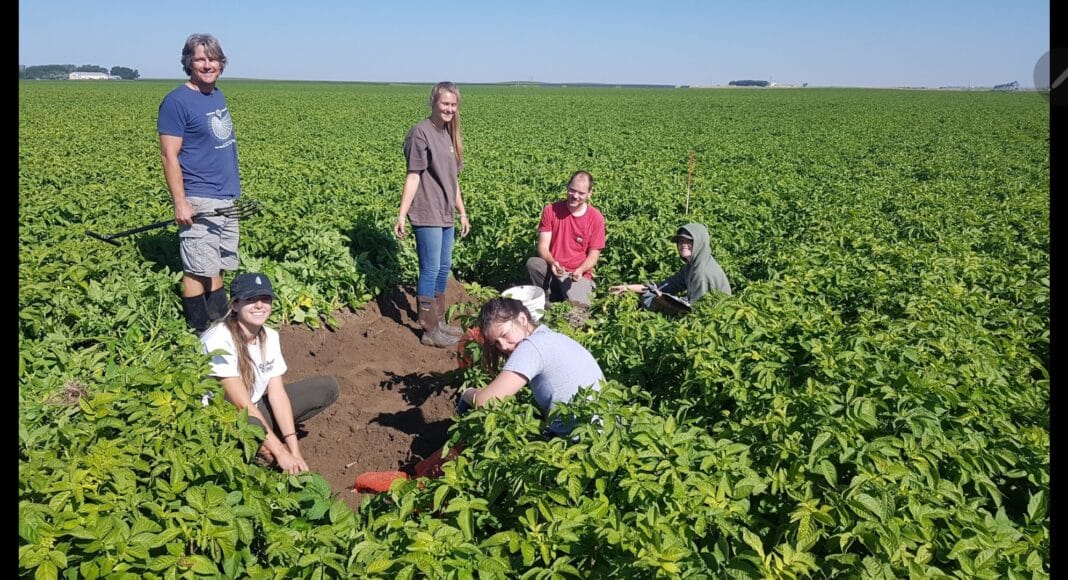Our regenerative agriculture journey started with a passion for soil health. Healthy soil is the foundation we use to deliver nutrient dense healthy spuds to our customers and ultimately the population.
At Perry Family Farm in Chin, Alta. we’re trying to balance our soils to make them as healthy as possible which in turn helps our crops to be healthy. My brother Chris and I, along with our whole family, have focused on soil biology. We realized the habitat that the soil biology builds is what creates healthy soils. The symbiotic relationships between the plants and the soil biology are what helps up maximise the genetic potential of our potato plants.
There are three practices we use to do this, as we know anything we do to the soil affects its biology. Fertilizer can throw of the balance as the plant doesn’t engage with the soil biology to mine nutrients when it has readily available fertilizer. If the plant hasn’t formed symbiotic relations with the soil’s biology, it then becomes less resilient. Next, we try to use as minimal tillage as possible. Tillage is hard on the soil biology’s habitat. The habitat is the organic matter that holds nutrients and water creating pores throughout the soil. The last practice we use is reducing our reliance on pesticides which harm soil diversity and life. We only use them as needed and only using environmentally friendly pesticides. By using these three practices it provides us with the least harmful path to protect our soil biology and health.
To protect and build our soil we’ve been practicing cover cropping for the past 15 years. Ahead of our potatoes we’ll plant a cover crop mix, if we’re early enough we plant a warm season mix, and if it’s later in the fall we’ll plant a cold season mix. Our warm season mix includes black oats, buckwheat, oilseed radish and Japanese pearl millet — all of these help reduce our nematode numbers. Our cold season mix has winter cereals, fababeans and oats in it, these species acidify the soil freeing up and cycling nutrients such as manganese, potassium and phosphorus, through to our spuds. We only use around 15 lbs of winter cereals and about 40 lbs total for cereals in our mixes, this is so they don’t become a plugging problem with spring planting.
In 2014 we added a biogas digester to our farm, at the time there was a provincial government program which helped fund the purchase. We were tired of putting our culled potatoes back out on the land. The potatoes that we graded out, which usually had rot or green, were put right back on our fields — so we were reinoculating our soils with those potato diseases.
We take the farm organic and manure waste, such as the cull potatoes, and instead of putting them out on the land as is we run them through the digester. The digester’s anaerobic bacteria create methane gas reducing greenhouse emissions. This leaves the nutrients in the manure which we then spread on our land. The digester produces electricity which is used power our farmyard including all our potato storages. The extra electricity is sold back to the provincial electrical grid.
It’s not easy though, and we’ve struggled in the past to have enough feedstock to fill it. Last year we sold two thirds of our share in the digester to EverGen. We still own a third of it and all our cull potatoes still go into it, we just don’t have to deal with the stress of keeping it running daily.
The digester isn’t the only digestate we use. Last year we started trading land with a feedlot owner. He grazed his cows on our fall cover crops. Through attending seminars on soil health, we learned the fastest way to build soil health is to have animals on the land. If the cattle mob graze it, you get the fastest organic matter increase on your land. We’re looking forward to seeing the results of the cattle grazing this growing season.
Our soil health passion is an ongoing endeavour. We’re always testing out new practices. This year we’re looking forward to using a Rainmaker Irrigation system, which oxygenates irrigation water to make it similar to natural rainfall. We’re working with Lethbridge College and the Potato Growers of Alberta on this, they’ll be doing soil tests. We look forward to seeing if this helps our soil by getting more air into it, breaking up calcium and magnesium carbonates to make them more available for spuds.











